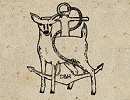Contact Seller
Doe And Hope
Tel07729 213013Please quote Antiques Atlas.

 Lovely framed photographs of the 2 Brighton Piers
Lovely framed photographs of the 2 Brighton Piers
 Half-length Black & White Portrait
Half-length Black & White Portrait
 Collection of Victorian Photographic Actor Prints
Collection of Victorian Photographic Actor Prints
 Victorian School Photo In Frame
Victorian School Photo In Frame
 Monochrome Alpine Views of the Eiger, Switzerland
Monochrome Alpine Views of the Eiger, Switzerland
 Large Framed Photograph
Large Framed Photograph
 Ambrotype And Tintype Portraits
Ambrotype And Tintype Portraits
 William Bradford, The Arctic Regions, 1873
William Bradford, The Arctic Regions, 1873
 William Bradford, The Arctic Regions, 1873
William Bradford, The Arctic Regions, 1873
 Victorian Photograph Album With 149 Albumen Photos
Victorian Photograph Album With 149 Albumen Photos
 Cased Ambrotype image of a Victorian lady
Cased Ambrotype image of a Victorian lady
 An 'Instant Family' from the Victorian Era
An 'Instant Family' from the Victorian Era
Non UK callers :
+44 7729 213013
West Sussex Lunatic Asylum Staff Photograph c.1900

The scarce original albumen print photograph of twenty-one electrical and sanitary department staff of West Sussex Asylum Chichester, shown outside the asylum with some of their essential working equipment, being photographed by Charles Barden snd marked to lower margin, the whole being mounted on printed surround, framed and glazed and surviving from the zeniths of the nineteenth century.
There is some expected light discoloration to the page edges in places but largely the whole remains in-tact. The giltwood frame is in keeping, if not of the period, with a couple of chipped losses.
The construction of asylums was widespread in Britain following The Lunacy Act of 1845, which resulted primarily from the work of John Connolly and Lord Shaftsbury. This act professionalised the asylum and ensured that each institution was mediated by the local authority. It marked a paradigmatic shift, wherein ‘lunatics’ began to be considered as patients instead of prisoners.
The West Sussex Lunatic Asylum was designed in 1894 by the architect Arthur Blomfield. The asylum was intended to serve the pauper agricultural population of rural West Sussex and for this purpose the 370 acre Graylingwell Farm estate was acquired c 1894. The farmhouse had, in the 1850s, been an early home of the author Anna Sewell, who later wrote Black Beauty.
Blomfield produced a design to accommodate 450 patients in ward pavilions laid out in echelon arrangement to form a broad arrow plan. Space was left for the addition of an extra ward pavilion on either side of the building, for an extra 150 male and female patients. The echelon style, developed in the 1870s and 80s, had by this date become the common pattern for asylum buildings. The wards were each intended to be occupied by a different medical class of patient, including sick and infirm, recent and acute, and epileptic. The airing courts were arranged adjacent to the wards as in earlier C19 asylum designs, and the parkland, including a large kitchen garden, enclosed the building and courts and included recreational facilities. The asylum opened officially in 1897.
The Asylum Rule Book stated the following:
“There be at least one attendant for every ward and that there be not less than one attendant for every 25 patients who are tranquil or convalescent and not less than one attendant for every 12 patients who are dirty, violent, refractory or dangerous to themselves or others. No ward shall be left at any time without an attendant being there and that the attendant be so distributed that in case of need they may readily assist each other.”
The photographer, Charles Hugh Barden, was born in Bayswater, London in 1862, the son of Charles and Bertha Barden. It is likely he was employed as an operator or manager in the town before he took over Malby's photography business in Chichester in 1894. In an advertisement published in 1898, Charles H. Barden is described as a "Portrait and Landscape Photographer". Although Barden was known to employ an assistant, his advertisements clearly state that "Chas. H. Barden will personally photograph each sitter". He remained in Chichester for over 10 years.
A rare survivor and one that conjures up many a thought about the conditions that these men worked in.
SellerDoe And Hope
View all stock from
Doe And Hope

 Private dealer, By appointment only
Private dealer, By appointment only
The Onion Barn, Shoe Cottage,
15 High Street, Blunham,
Bedfordshire, MK44 3NL.
MK44 3NL
Tel : 07729 213013
Non UK callers : +44 7729 213013
Get directions to Doe And Hope
There is some expected light discoloration to the page edges in places but largely the whole remains in-tact. The giltwood frame is in keeping, if not of the period, with a couple of chipped losses.
The construction of asylums was widespread in Britain following The Lunacy Act of 1845, which resulted primarily from the work of John Connolly and Lord Shaftsbury. This act professionalised the asylum and ensured that each institution was mediated by the local authority. It marked a paradigmatic shift, wherein ‘lunatics’ began to be considered as patients instead of prisoners.
The West Sussex Lunatic Asylum was designed in 1894 by the architect Arthur Blomfield. The asylum was intended to serve the pauper agricultural population of rural West Sussex and for this purpose the 370 acre Graylingwell Farm estate was acquired c 1894. The farmhouse had, in the 1850s, been an early home of the author Anna Sewell, who later wrote Black Beauty.
Blomfield produced a design to accommodate 450 patients in ward pavilions laid out in echelon arrangement to form a broad arrow plan. Space was left for the addition of an extra ward pavilion on either side of the building, for an extra 150 male and female patients. The echelon style, developed in the 1870s and 80s, had by this date become the common pattern for asylum buildings. The wards were each intended to be occupied by a different medical class of patient, including sick and infirm, recent and acute, and epileptic. The airing courts were arranged adjacent to the wards as in earlier C19 asylum designs, and the parkland, including a large kitchen garden, enclosed the building and courts and included recreational facilities. The asylum opened officially in 1897.
The Asylum Rule Book stated the following:
“There be at least one attendant for every ward and that there be not less than one attendant for every 25 patients who are tranquil or convalescent and not less than one attendant for every 12 patients who are dirty, violent, refractory or dangerous to themselves or others. No ward shall be left at any time without an attendant being there and that the attendant be so distributed that in case of need they may readily assist each other.”
The photographer, Charles Hugh Barden, was born in Bayswater, London in 1862, the son of Charles and Bertha Barden. It is likely he was employed as an operator or manager in the town before he took over Malby's photography business in Chichester in 1894. In an advertisement published in 1898, Charles H. Barden is described as a "Portrait and Landscape Photographer". Although Barden was known to employ an assistant, his advertisements clearly state that "Chas. H. Barden will personally photograph each sitter". He remained in Chichester for over 10 years.
A rare survivor and one that conjures up many a thought about the conditions that these men worked in.
Price
Arrange a final price and delivery details directly with the dealer
Click here to message the seller The price has been listed in British Pounds.
The price has been listed in British Pounds.
Conversion rates as of 4/DEC/2025. Euro & Dollar prices will vary and should only be used as a guide.
Always confirm final price with dealer. Free UK shipping.
Category Antique Photography and Photographica
Date c.1900
1900s Antiques Material Paper
Origin European
Item code as155a2058 / 2149
Status For Sale
£295.00 
$394.50
€337.95

$394.50

€337.95

Looking to Buy?
Payment with PayPal is availableArrange a final price and delivery details directly with the dealer
Click here to message the seller

Conversion rates as of 4/DEC/2025. Euro & Dollar prices will vary and should only be used as a guide.
Always confirm final price with dealer. Free UK shipping.
View all stock from
Doe And Hope

 Private dealer, By appointment only
Private dealer, By appointment onlyThe Onion Barn, Shoe Cottage,
15 High Street, Blunham,
Bedfordshire, MK44 3NL.
MK44 3NL
Tel : 07729 213013
Non UK callers : +44 7729 213013
Get directions to Doe And Hope
You may also be interested in
 Lovely framed photographs of the 2 Brighton Piers
Lovely framed photographs of the 2 Brighton Piers
 Half-length Black & White Portrait
Half-length Black & White Portrait
 Collection of Victorian Photographic Actor Prints
Collection of Victorian Photographic Actor Prints
 Victorian School Photo In Frame
Victorian School Photo In Frame
 Monochrome Alpine Views of the Eiger, Switzerland
Monochrome Alpine Views of the Eiger, Switzerland
 Large Framed Photograph
Large Framed Photograph
 Ambrotype And Tintype Portraits
Ambrotype And Tintype Portraits
 William Bradford, The Arctic Regions, 1873
William Bradford, The Arctic Regions, 1873
 William Bradford, The Arctic Regions, 1873
William Bradford, The Arctic Regions, 1873
 Victorian Photograph Album With 149 Albumen Photos
Victorian Photograph Album With 149 Albumen Photos
 Cased Ambrotype image of a Victorian lady
Cased Ambrotype image of a Victorian lady
 An 'Instant Family' from the Victorian Era
An 'Instant Family' from the Victorian Era








